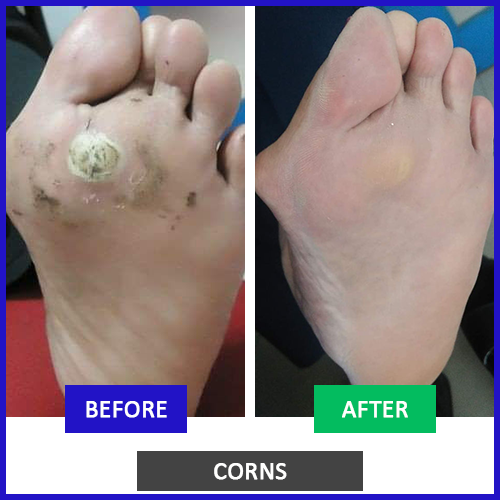Corns

1. What Are Corns?
Corns are thickened, hardened areas of skin that form due to repeated pressure or friction—commonly on the feet or toes. They develop as a protective response but can become painful or infected if left untreated.
2. Signs and Symptoms of Corns
- Small, Round, Raised Bumps: Often found on toes, heels, or soles
- Pain on Pressure: Especially when walking or wearing tight shoes
- Hard Center Surrounded by Inflamed Skin
- Dry or Waxy Surface Texture
- Discomfort in Footwear: Narrow shoes worsen the condition
3. Causes and Risk Factors
- Ill-Fitting Footwear: Tight shoes or high heels that cause friction
- Repetitive Pressure: From walking, running, or standing for long hours
- Foot Deformities: Hammertoes, bunions, or abnormal gait
- Lack of Foot Protection: Walking barefoot on hard surfaces
- Manual Labor or Barefoot Activity (in hand corns)
4. Types of Corns
- Hard Corns: Small, dense, thickened areas usually on top of toes or outer foot
- Soft Corns: White, rubbery in texture, found between toes due to moisture
- Seed Corns: Tiny corns on the bottom of the foot, often painless
- Neurovascular Corns: Corns with nerve and blood vessel involvement (painful)
5. Differential Diagnosis
It’s important to distinguish corns from similar conditions like calluses, plantar warts, or bunions. At CureYou, we conduct a careful assessment to ensure accurate diagnosis and effective treatment.
6. Can Corns Be Prevented?
Yes, with the right care:
- Wear properly fitted, cushioned shoes
- Use protective pads or socks
- Avoid prolonged pressure on specific foot areas
- Maintain good foot hygiene
- Moisturize dry skin regularly
7. Dietary Tips for Corn-Prone Individuals
While corns are mechanical in origin, overall skin and tissue health matter:
- Add: Vitamin A (carrots, pumpkin), Vitamin E (almonds, seeds), Omega-3s (flaxseeds, walnuts)
- Stay hydrated to keep skin soft and flexible
- Avoid: Processed, sugary foods that can worsen skin inflammation
8. Homeopathic Treatment for Corns at CureYou
Unlike chemical removal or surgical options, homeopathy offers a safe and lasting solution to corns—without pain or scarring. Our treatment focuses on:
- Softening and gradually dissolving corns
- Reducing pressure sensitivity and inflammation
- Correcting underlying tendencies, such as abnormal pressure points or skin thickening
- Preventing recurrence with constitutional treatment
- Improving overall foot and skin health
Each patient at CureYou receives a personalized prescription after a thorough case analysis.
9. Success Stories
From chronic corns due to standing jobs to painful foot corns in diabetics—our patients have experienced complete relief through homeopathy. No cutting, no harsh acids—just natural healing from the inside out.
Any questions? We're here to help
How does homeopathy treat corns without surgery or acid application?
Homeopathy treats corns by stimulating your body’s natural healing response, softening thickened skin, relieving pressure, and preventing recurrence. Unlike acids or surgical removal, our remedies work from within without pain, scarring, or side effects. At CureYou, we treat both the corn and its root cause for lasting results.

